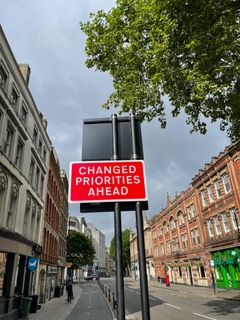In search of a new curriculum model Part 2 – Priorities
- andrewhampton584
- Jul 13, 2023
- 3 min read
Updated: Sep 10, 2024
I am blogging here about the fact that the current curriculum in the UK is not fit purpose. By that I mean that the people that the curriculum is aimed at – pupils in school – report that they find the teaching content largely dull and irrelevant. They want what they learn to be about real life, equipping them to thrive and survive in the adult world.
Sure, but then again I can remember saying the same thing myself when I was a teenager. Perhaps there is always going to be a gap between what the pupils think and what the educationalists think is relevant. I think it is different now, though, because – as I wrote in my blog about alienation – there are fewer and fewer ways in which cultural references and cultural capital overlap between the generations. That leads to mistrust and which in turn leads to poor engagement and motivation.
So many of the ills in school come down to the curriculum. Poor behaviour, underachievement, sexual abuse and misogyny, teacher recruitment and retention, overwhelmed leaders – all of it; things need to change.
I know it’s obvious, but what lies at the heart of the education system are priorities. If we were to write a list of the purposes of education it would be a long list, containing some aspects that were contradictory. Just as an example, it is inherently incongruous to promote excellence through academic competition and at the same time want classroom activity to build self-esteem and success for all participants. For every winner there are many losers. Losing is not necessarily a bad thing and we all need to learn how to lose well; but you can have too much of bad thing, despite it also being a good thing.
So, we have to set priorities that are not incongruous and apply those priorities across the curriculum at all levels. That starts with the central purposes of education (its vision and values if you like), which will then inform everything else, right down to the granular level of how subject areas are defined, how they are taught, who by, to how many at a time and for how long. And it seems to me that we have not looked at any of this, other than to tinker at the edges, for a very long time; certainly not in my life time. The changes we have made and continue to make to the curriculum have come about for reasons that are dominated by political thinking and money.
This is how I see the drivers that lie behind the continuation of our existing education system:
1. The ultimate decision-maker for Education is a politician not an educator. The Secretary of State for Education rarely if ever has any classroom experience. They are not in post for long enough to be held to account for their decisions and usually regard the Department for Education as a stepping-stone for higher political office. Their job is to be seen to ‘make a difference’ so that their executive prowess will be spotted by their political masters and party members. Change is therefore driven by political bias – for instance, those who believe in selective education and those who specifically do not.
2. The curriculum and the way it is taught is slave to the assessment frameworks that are applied at different ages and for different reasons.
3. Assessment frameworks have become increasingly high-stakes because one of the key values being applied to education is accountability.
4. Accountability, in its turn, has been lauded because our political system has been driven by a global drift towards the marketisation of all aspects of society and neo-liberalism.
Marketisation and neo-liberalism therefore directly effects the way children are taught, what they are taught, by whom, to how many at a time and for how long. (Ironically, those who believe that accountability is the key to a successful and efficient education system have not promoted the idea of Politics as a stand-alone subject area.)
New priorities
So, what might things look like if we shifted the paradigm of values that drive both the status quo and change? Instead of being governed by political thinking and value for money, could we conceive an education system based on the needs of children and their passage from early childhood through to adulthood?
Thoughts on a postcard, please, while I mull that one over.




Comments